-
 Ever Wondered How to Make Paneer at Home? Here is the Complete Guide to Take Out Soft and Creamy Paneer from Milk at Home (2021)
Ever Wondered How to Make Paneer at Home? Here is the Complete Guide to Take Out Soft and Creamy Paneer from Milk at Home (2021)
-
 Want More Tantalizing Breakfast Ideas? Here are 6 Scrumptious Egg Recipes for Breakfast That Will Make You Want to Eat Eggs All Day (2020)
Want More Tantalizing Breakfast Ideas? Here are 6 Scrumptious Egg Recipes for Breakfast That Will Make You Want to Eat Eggs All Day (2020)
-
 How to Increase Weight: Foods to Include in Your Diet for Your Weight Gain Journey + Tips for Gaining Weight (2020)
How to Increase Weight: Foods to Include in Your Diet for Your Weight Gain Journey + Tips for Gaining Weight (2020)
What are Chlorella and Spirulina!
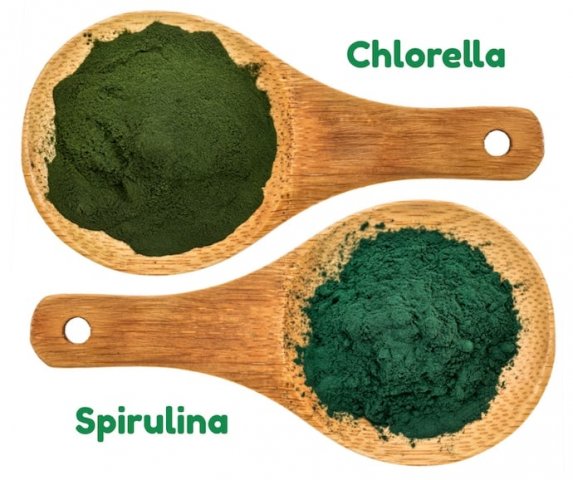
Chlorella belongs to a species of single-celled algae that is naturally green in color due to the presence of chlorophyll. Chlorella requires water, carbon dioxide, and a few minerals to reproduce rapidly. Chlorella is known as a superfood as it’s full of proteins, vitamins, and nutrients and was considered a promising food source during the late 1940s when the world was facing a food crisis. Today, it’s known as a dietary supplement and available in powder and tablet form. Raw Chlorella is not consumable, thus it needs to be processed and is made edible in form of powder or tablets.
Spirulina also belongs to the algae family and is blue-green color algae that are consumable and is termed as a whole food due to the high content of proteins, vitamins, and carbohydrates. A dietary supplement, Spirulina is also used as a food supplement in aquaculture and poultry industries. It’s also used as a feed supplement in household aquariums. Spirulina is known to mankind since the 14th century when it was harvested in lakes and consumed by Aztecs and Mesoamericans.
Chlorella Vs Spirulina - Components
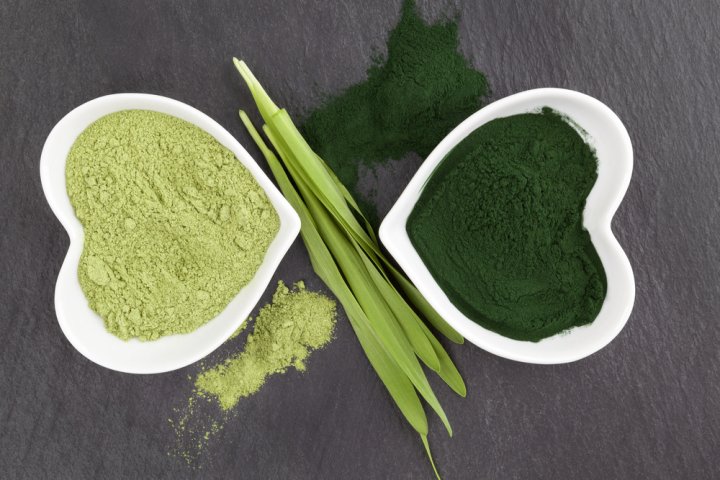
Chlorella and Spirulina are well-known algae supplements and considered superfoods due to the rich nutrients found in them.
Chlorella has a high quantity of calories, omega-3 fatty acids, riboflavin, provitamin A, zinc, magnesium, and iron while Spirulina has a lower amount of calories, but a high amount of protein, thiamine, riboflavin, iron, and copper.
Chlorella Vs Spirulina - Major Differences
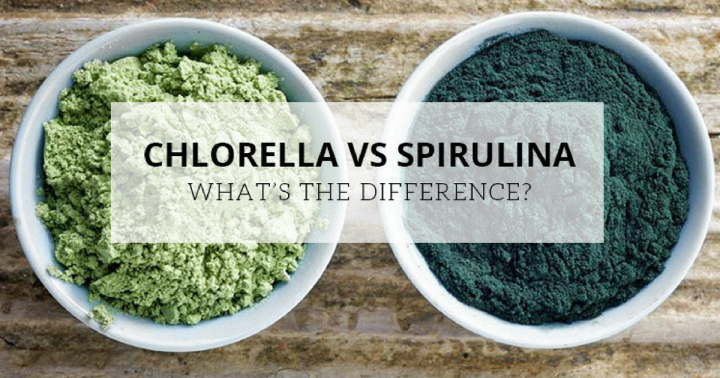
Though both Chlorella and Spirulina are rich in nutrients and belong to the algae family, there are few noteworthy differences between the two.
Chlorella has a high content of omega-3 fatty acids thus a nice option for vegans who want to take omega-3 fatty acids through a vegetarian supplement. The three types of omega-3 fatty acids are - docosahexaenoic acid (DHA), eicosapentaenoic acid (EPA), and alpha-linolenic acid (ALA). ALA is found in plants and our body can convert it into DHA and EPA, thus Chlorella fulfills the complete requirement of omega-3 fatty acid. Further, Chlorella has double the amount of calories than Spirulina.
Spirulina has more and ‘complete’ protein as it contains all the essential amino acids and more antioxidants like vitamin C and vitamin E as compared to Spirulina.
Health Benefits of Chlorella
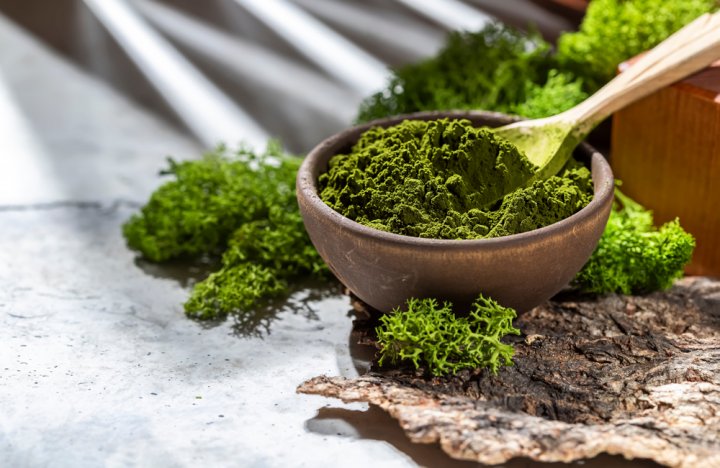
Chlorella is not only high in nutrients but has many other health benefits which include – aiding detox by removing heavy metals, boosts the immune system, improves cholesterol levels, keeps blood pressure in check, acts as an anti-oxidant, helps in respiratory diseases, improves endurance and regulates blood sugar levels.
Health Benefits of Spirulina
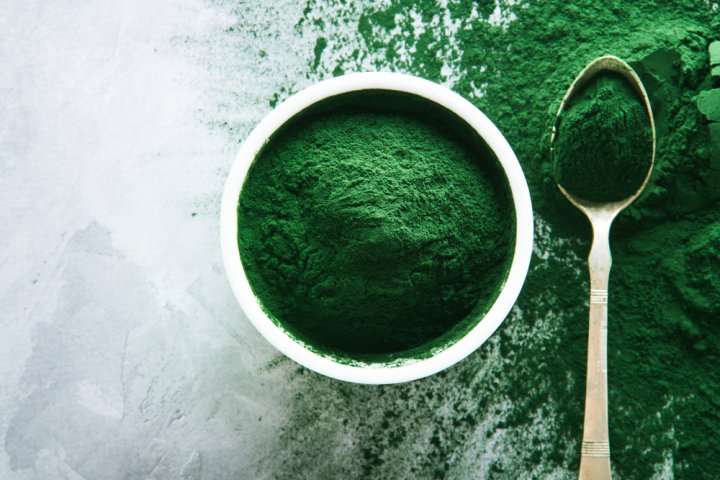
Spirulina is also very high in many nutrients and provides several benefits as it has powerful anti-inflammatory and anti-oxidant properties. It increases “good” HDL cholesterol, lowers “bad” LDL cholesterol and triglycerides, and also secures “bad” LDL cholesterol from oxidation. Spirulina may reduce blood pressure and possibly have anti-cancer properties. It may be effective against anemia and improves muscle strength.
Common Benefits of Chlorella and Spirulina
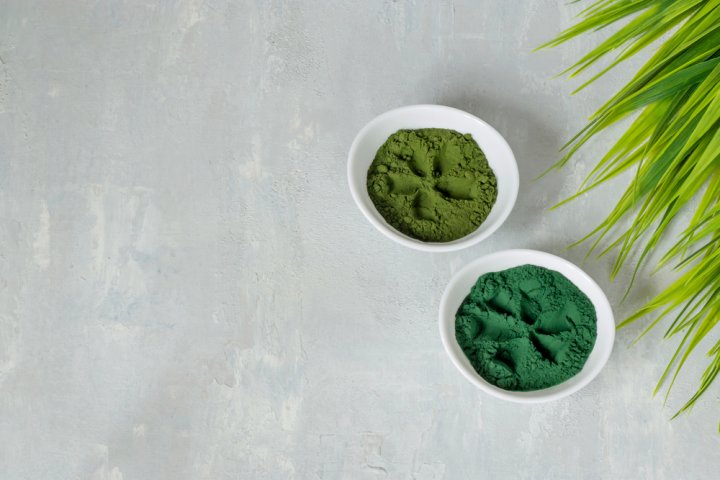
Both the algae-based food supplements are beneficial in blood sugar control, improves heart health, rich in antioxidants, and are good sources of vitamins and beta-carotene.
1. Rich in Antioxidants

Chlorella and Spirulina both are very high in antioxidants. Antioxidants combine with free radicals in your body to prevent the tissues and cells from any potential damage. A study done on a group of smokers suggested that those who were given Chlorella experienced 44% increased levels of vitamin C and 16% increase in vitamin E in their blood after 6 weeks. The participants who were given Chlorella showed a noticeable decrease in DNA damage as well. In another study, a group of people suffering from the chronic obstructive pulmonary disease (COPD) was given Spirulina for 60 days and experienced a 29% increase in blood levels of vitamin C while the oxidative stress reduced by up to 36%.
2. Benefit Blood Sugar Control

Multiple studies have shown that regular consumption of these food-based supplements is beneficial in blood sugar management. The root cause is still under study, but several studies have indicated increased insulin activity by using Spirulina. Further, many studies on humans suggest that regular use of Chlorella supplements may increase insulin sensitivity thus effective in blood sugar management. Insulin is a hormone that carries blood sugar from the blood into the cells to be used for energy and Insulin sensitivity is important for the smooth functioning of this hormone.
3. Good for Heart Health

Various studies have shown that Chlorella and Spirulina are helpful to improve heart health by influencing your blood pressure levels and blood lipid composition. In different studies, participants who were given Chlorella and Spirulina showed a reduction in LDL (bad) cholesterol and an increase in HDL (good) cholesterol while the blood pressure also lowered significantly after the 3-month study. Thus, both Chlorella and Spirulina may reduce your blood pressure levels and improve cholesterol management as well.
4. High in Nutrition

Both the superfoods, Chlorella, and Spirulina, are highly nutritious and rich in vitamins that include vitamin A, vitamin B1, vitamin B2, and also have carbohydrates, fats, magnesium, folate, phosphorus, magnesium, iron, copper, zinc, and beta-carotene. Both the food supplements contain all essential amino acids which are easily absorbed by our body. Spirulina is used as a dietary supplement by NASA for their astronauts during space missions due to its high protein content.
Chlorella vs Spirulina - Potential Side-Effects

- Though Chlorella and Spirulina are full of health benefits, there are few side effects associated with both of them. So, you should consider the downsides of these superfoods before you include either of these in your diet plan.
- The side effects associated with Chlorella include an allergic reaction that includes asthma or other breathing problems, diarrhea, skin sensitivity to sunlight, flatulence, nausea, stomach cramping, or green color stools. Moreover, Chlorella should be avoided during pregnancy or while breastfeeding.
- Spirulina, if grown in water polluted with harmful particles, bacteria, or heavy metals, may be contaminated. Regular use of Spirulina boosts immunity and sometimes it can result in autoimmune diseases like rheumatoid arthritis and multiple sclerosis. It may also slow the blood clotting process as Spirulina has anticoagulant properties. Few people who are allergic to Spirulina may complain of insomnia, headaches, and nausea, etc.
Chlorella
Spirulina
-
 Say Goodbye to Uncomfortable Gas Problem with these Easy Home Remedies for Gas Relief 2020
Say Goodbye to Uncomfortable Gas Problem with these Easy Home Remedies for Gas Relief 2020
-
 नाश्ता दिन का सबसे महत्वपूर्ण भोजन है: यहां 10 सर्वश्रेस्ठ पौष्टिक और कम समय में तैयार होने वाली भारतीय नास्ता रेसिपी की सूचि दी गयी है जो आपको दिन शुरू करने के लिए पर्याप्त ऊर्जा देंगी,अभी देखें(2020)।
नाश्ता दिन का सबसे महत्वपूर्ण भोजन है: यहां 10 सर्वश्रेस्ठ पौष्टिक और कम समय में तैयार होने वाली भारतीय नास्ता रेसिपी की सूचि दी गयी है जो आपको दिन शुरू करने के लिए पर्याप्त ऊर्जा देंगी,अभी देखें(2020)।
-
 Breakfast is the Most Important Meal of the Day: 10 Nutritious and Easy-to-Make Indian Breakfast Recipes to Start Your Day (2019)
Breakfast is the Most Important Meal of the Day: 10 Nutritious and Easy-to-Make Indian Breakfast Recipes to Start Your Day (2019)
-
 Can't Figure Out the Best Biryani Recipes to Fulfil Your Appetite(2020)? Fret Not, Read on to Find One You Will Definitely Want to Try Right Away!
Can't Figure Out the Best Biryani Recipes to Fulfil Your Appetite(2020)? Fret Not, Read on to Find One You Will Definitely Want to Try Right Away!
-
 Looking for Something Proteinaceous to Include in Your Diet? Simple Egg Recipes You Can Consider which are As Delicious As They are Healthy! (2021)
Looking for Something Proteinaceous to Include in Your Diet? Simple Egg Recipes You Can Consider which are As Delicious As They are Healthy! (2021)
Dietary Supplements Used By NASA - Chlorella vs Spirulina
Hefty on proteins, vitamins, vital nutrients, and minerals the Chlorella and Spirulina superfoods are among the best dietary supplements. They contain a few differences, such as Chlorella having a higher calorie count compared to Spirulina. On the other hand, Spirulina is higher in protein as compared to Chlorella and even used by NASA Astronauts during space exploration missions. Chlorella and Spirulina together sum up a lot of heath benefits. They contain antioxidants good for blood circulation and oxidation, enhance and improve the heart health, they also help lower LDL, which is the bad cholesterol and triglycerides, and increase the HDL the good cholesterol in the body.

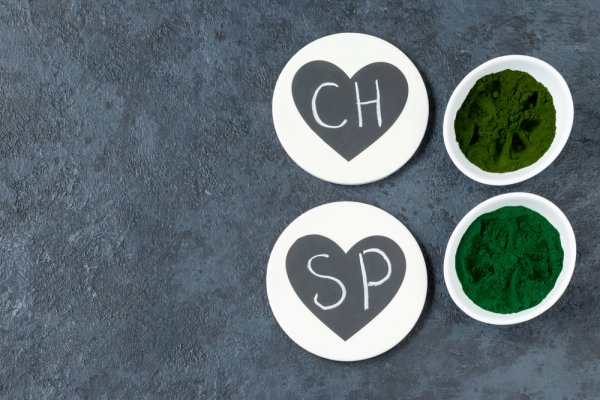
 Highlight the Best Facets of Your Incomparable Beauty: Discover the Best Face Highlighter Currently Available in India and Everything You Need to Know About Using Face Highlighters for Maximum Effect (2023)
Highlight the Best Facets of Your Incomparable Beauty: Discover the Best Face Highlighter Currently Available in India and Everything You Need to Know About Using Face Highlighters for Maximum Effect (2023)
 Forget the Blemishes and Get that Picture Perfect Flawless Radiance on Your Face: Check out the Best Foundations for Oily Skin Currently Available in India and Everything You Need to Know About Makeup Foundations (2023)
Forget the Blemishes and Get that Picture Perfect Flawless Radiance on Your Face: Check out the Best Foundations for Oily Skin Currently Available in India and Everything You Need to Know About Makeup Foundations (2023)
 Make Your Presence Felt Wherever You Go: Discover the Best Perfumes Under 2000 for Both Men and Women to Announce Your Arrival and Make Any Occasion Memorable (2023)
Make Your Presence Felt Wherever You Go: Discover the Best Perfumes Under 2000 for Both Men and Women to Announce Your Arrival and Make Any Occasion Memorable (2023)
 Protect Your Oily Skin from the Harmful Rays of the Sun: Discover the Best Gel Based Sunscreens for Oily Skin and Everything You Need to Know Before Buying One (2023)
Protect Your Oily Skin from the Harmful Rays of the Sun: Discover the Best Gel Based Sunscreens for Oily Skin and Everything You Need to Know Before Buying One (2023)
 Minor Blemishes and Wrinkles Affecting Your Confidence? Check out the Best BB Creams to Conceal Your Worries and Nourish Your Skin to Restore the Healthy, Radiant and Glowing Complexion Back Again (2023)
Minor Blemishes and Wrinkles Affecting Your Confidence? Check out the Best BB Creams to Conceal Your Worries and Nourish Your Skin to Restore the Healthy, Radiant and Glowing Complexion Back Again (2023)
